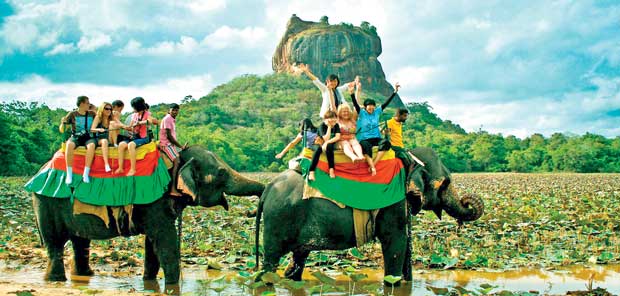Reply To:
Name - Reply Comment

 “When the same people are the ones doing things year after year, nothing really different occurs because these same people do things that appeal to their sense of values – not anyone or everyone else’s.”
“When the same people are the ones doing things year after year, nothing really different occurs because these same people do things that appeal to their sense of values – not anyone or everyone else’s.”
An evolving hypothesis between protection from infection and autoimmunity is that the human immune system lives on the sword’s edge - balancing between inflammation and regulation. Interestingly, one could draw an analogy between this and the current state of Sri Lanka’s tourism industry. Though our hospitality industry is clearly rebounding from the post-2009 era, looking at the long-term data will lead to one conclusion: we face significant headwinds.
It’s true that overall, the industry revenue has increased, total annual room inventory is boosted by the addition of new keys and the number of new properties has grown considerably over the past six years - but for how long will this translate into continued improved profitability for the industry? So, while we are growing on the top line, our profit per room will sooner than later, begin to shrink?
Within the next couple of years, we will see international chain hotels such as Grand Hyatt, Shangri-La, Sheraton, ITC and Mövenpick to name a few, commence operations in Colombo. And that’s when yields for locally-managed hotels are likely to remain tight across most markets, unless they move away from jostling with each other in the commodity market. Commoditization occurs when there is not a significant value differentiation among the supply base. The current ‘engagement’ results show that it has dropped nationwide.
No longer do hotels cement their relationships with the traveller with impactful moments, such as remembering, greeting by name or knowing each guest as a unique individual – all personal interactions that have, and will always be, the hallmark of great service. Hotels that fail to recognize and communicate with their customers as unique individuals will be just another ‘John Doe’. This means that between brands, products or services, in the eyes of the customers, there is not a notable difference. And what is important in making the purchase decision is purely the price. Small wonder then why Colombo’s minimum room rate policy continues to prevail since 2009.
Groping in the dark
As the international to local chain ratio narrows, the blurring on star ratings will also widen. There’s no hiding the fact that some of our hotel star ratings are largely inflated in an industry that is poorly or barely regulated. Sure, there’s a noticeable difference between a one-star property and a five-star property. But that’s pretty much it. Someone else’s five-star could be your three-star and you wouldn’t know it until you get there. But who cares?
All this would lead to hotels talking less about stars and more about luxury, luxury major, luxury exclusive, upper upscale, upscale, upper midscale, midscale, lower midscale, economy and so on. Whatever the case, many hotels that describe themselves in these term, will in essence, do so as flags of convenience; at best, vague and suspiciously pretentious and at worst, unnecessarily confusing.
To cut to the chase - even if there is growth exhibited in the broader economy over a relatively longer time horizon, will our tourism industry be positioned to take full advantage of it? I guess some players in the industry will be ready whilst most may grope in the dark, unless the planets move and the stars align to create the perfect cosmic conditions for tourism in Sri Lanka.
Moving beyond the role of ‘tourism cop’
Last October, the Tourism mMinister appointed 19 to 20 prominent persons in the leisure industry to the Tourism Advisory Committee (TAC). The two highest priorities for any task force should be, firstly, to ensure that Sri Lanka maintains its tourism momentum throughout the year, and secondly, to protect the uniqueness of the country. Ensuring momentum means marketing and positioning Sri Lanka as a year-round destination.
At the outset, the TAC would have primarily directed its gaze towards the continued identification of problem areas, encouraging tourism operators to adhere to guidelines intended to minimize impacts and monitoring community opinions on tourism. By now, the major tourism-related issues for Sri Lanka should have been singled out.
There will be some prolonged focus on the negative aspects of tourism during the TAC’s first year - no doubt necessary to catch up on the issues that had been building for some time. However, the committee members must agree that it is necessary to move beyond the role of ‘tourism cop’ and find ways to enhance the positive contribution of tourism in Sri Lanka.
Maximising industry potential
This requires advising the Tourism Development Authority (TDA) to resist measuring success on promoting tourism solely ‘vis-à-vis’ the number of ‘arrivals’, ‘room nights’, ‘heads in beds’ or ‘room spend’. Verily, I believe, it must bring much more to the table. Let’s face it; the primary role of any tourism bureau is to choreograph the overall destination experience. In doing so, it must attach importance to driving economic development and improving the quality of life for the entire destination.
Normally, and, as with bureaus in most countries, a sizeable amount of the bureaus’ funding comes from the tax on hotel rooms. Understandably, over time, its attention is biased more towards the hotels than the other stakeholders. Compounding the problem further, we now see that this conventional funding model —where hotel tax collections are disbursed by governments to the authority —is no longerreadily available, stable or secure!
Our political leaders see the opportunity to invest these easily raked in revenues into non-economic development type of activities. When politicians muck around with the room and associated hospitality-related taxes and don’t invest them to obtain the greatest return, we will continue to measure the TDA’s value proposition merely on driving ‘visitors’ to ‘room nights’ - further diminishing the authority’s appeal for securing funding.
As a conceivable alternative, the TAC must advise the TDA to investigate and pursue other revenue sources, including partnering more aggressively with the private sector, not forgetting that, ultimately, destination marketing becomes the marketing arm for everything for a region or a community. And this includes both the local business community and local residents. No longer is it related to just counting ‘visitors’.
Protecting uniqueness of country
Protecting the uniqueness of the country relates to assuming responsibility for the protection and preservation of historical and cultural achievements and natural phenomena, biodiversity conservation, halting degradation of ecosystems and espousing maritime-based development, known as the ‘blue economy’ (protection of the coral reefs, etc.) among other things.
Tourism has become a fiercely competitive business. Competitive advantage is no longer natural but increasingly man-made: driven by science, technology, information and innovation. As such, it is not simply the stock of natural resources of Sri Lanka that will determine her competitiveness in tourism, but rather, how these resources are managed and to what extent they are complemented with man-made innovations.
Consider what’s happening at the Yala National Park, the country’s most visited wildlife sanctuary. Clearly, there is a serious issue of carrying capacity here. In addition, trail deterioration, habitat disruption and a host of other destructive issues, despite repeated misgivings, continues to be business as usual. The Wildlife and Sustainability Minister recently voiced concern especially with Sri Lanka targeting 2.5 million tourists this year. He needs to look beyond… to 2020, when four million tourists are expected. How will the park cope? Don’t be surprised if by then, someone in parliament suggests we import wild animals to replace those we destroyed!
It is no different on water – our whale watching industry too is under stress due to noise and fuel pollution from ‘crowding’. In the short term, a boat interacting with whales can disrupt their activities, like stopping them foraging for food or resting. This, when done once or twice, is not cause for concern, but problems start if this is repeated again and again over time, without guidelines and when it leads to a free-for-all. If you repeatedly cause stress to the whales, they will only end up moving out of the area.
In the new world of things, where change is normal, the members of the TAC, can no longer focus on the here and now, instead it must look to the future. It cannot be a committee that doesn’t want to get ‘hands on’ or doesn’t want to work that hard, because this is difficult terrain. These, like many other challenges, need to be overcome and some can only be tackled with a non-gentle approach. Above all, that then… is the million dollar question. Will the TAC or any other appointed task force be able to ‘stand and deliver’?
(Shafeek Wahab, a hospitality consultant, professional trainer and speaker, works with organisations that want to become more customer-centric by changing how they deal with customers and are passionate about enhancing their reputation. With an extensive background in hospitality management spanning over 30 years, he uses his experience and knowledge to provide assistance to clients who want to move beyond the limitations of traditional ‘best practices’. He can be contacted [email protected]. Website: www.in2ition.biz)